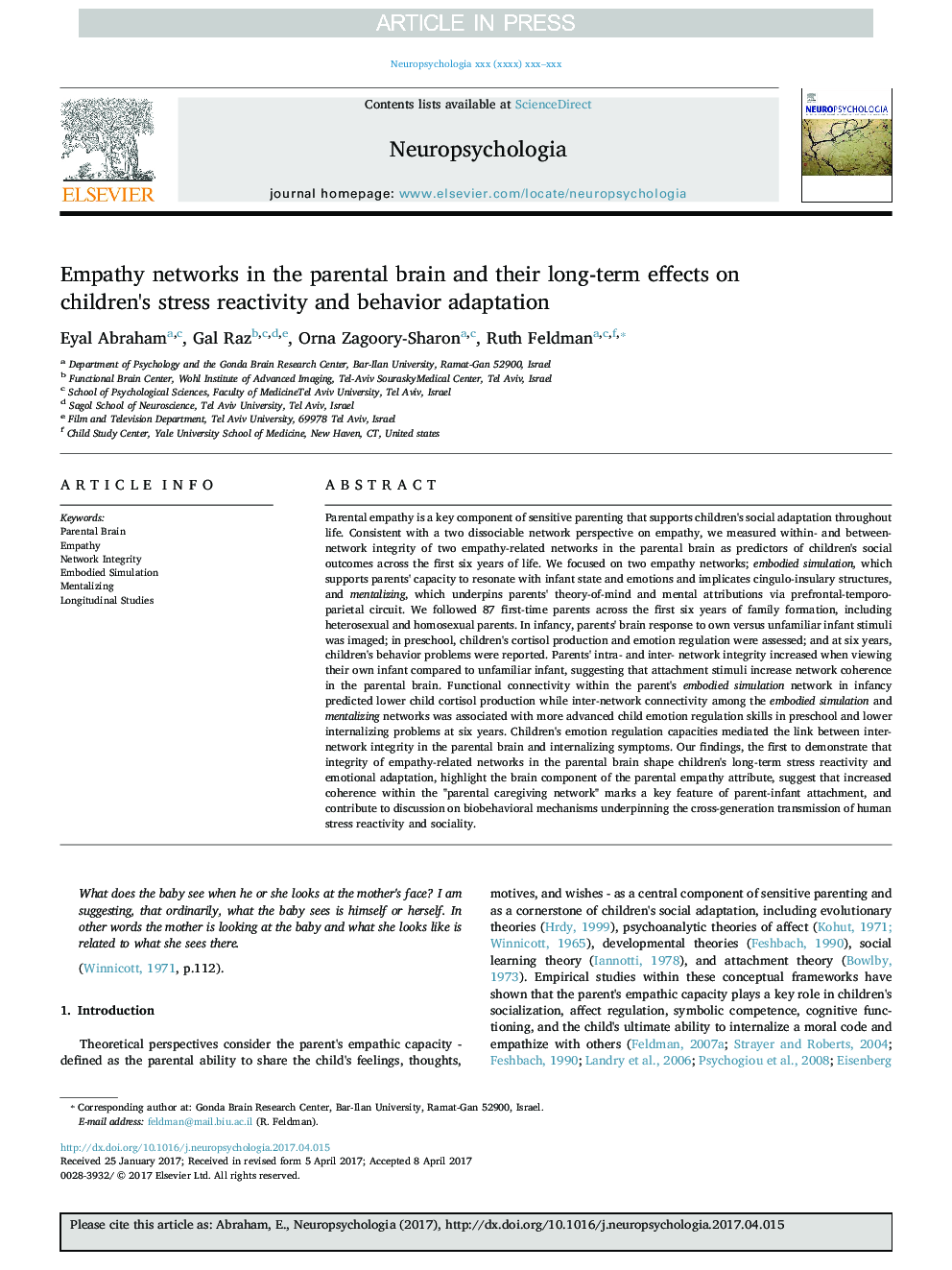| کد مقاله | کد نشریه | سال انتشار | مقاله انگلیسی | نسخه تمام متن |
|---|---|---|---|---|
| 8942273 | 1645068 | 2018 | 11 صفحه PDF | دانلود رایگان |
عنوان انگلیسی مقاله ISI
Empathy networks in the parental brain and their long-term effects on children's stress reactivity and behavior adaptation
ترجمه فارسی عنوان
شبکه های همدلی در مغز والدین و اثرات درازمدت آنها بر روی واکنش پذیری و تناسب اندام کودکان است
دانلود مقاله + سفارش ترجمه
دانلود مقاله ISI انگلیسی
رایگان برای ایرانیان
کلمات کلیدی
موضوعات مرتبط
علوم زیستی و بیوفناوری
علم عصب شناسی
علوم اعصاب رفتاری
چکیده انگلیسی
Parental empathy is a key component of sensitive parenting that supports children's social adaptation throughout life. Consistent with a two dissociable network perspective on empathy, we measured within- and between-network integrity of two empathy-related networks in the parental brain as predictors of children's social outcomes across the first six years of life. We focused on two empathy networks; embodied simulation, which supports parents' capacity to resonate with infant state and emotions and implicates cingulo-insulary structures, and mentalizing, which underpins parents' theory-of-mind and mental attributions via prefrontal-temporo-parietal circuit. We followed 87 first-time parents across the first six years of family formation, including heterosexual and homosexual parents. In infancy, parents' brain response to own versus unfamiliar infant stimuli was imaged; in preschool, children's cortisol production and emotion regulation were assessed; and at six years, children's behavior problems were reported. Parents' intra- and inter- network integrity increased when viewing their own infant compared to unfamiliar infant, suggesting that attachment stimuli increase network coherence in the parental brain. Functional connectivity within the parent's embodied simulation network in infancy predicted lower child cortisol production while inter-network connectivity among the embodied simulation and mentalizing networks was associated with more advanced child emotion regulation skills in preschool and lower internalizing problems at six years. Children's emotion regulation capacities mediated the link between inter-network integrity in the parental brain and internalizing symptoms. Our findings, the first to demonstrate that integrity of empathy-related networks in the parental brain shape children's long-term stress reactivity and emotional adaptation, highlight the brain component of the parental empathy attribute, suggest that increased coherence within the "parental caregiving network" marks a key feature of parent-infant attachment, and contribute to discussion on biobehavioral mechanisms underpinning the cross-generation transmission of human stress reactivity and sociality.
ناشر
Database: Elsevier - ScienceDirect (ساینس دایرکت)
Journal: Neuropsychologia - Volume 116, Part A, 31 July 2018, Pages 75-85
Journal: Neuropsychologia - Volume 116, Part A, 31 July 2018, Pages 75-85
نویسندگان
Eyal Abraham, Gal Raz, Orna Zagoory-Sharon, Ruth Feldman,
